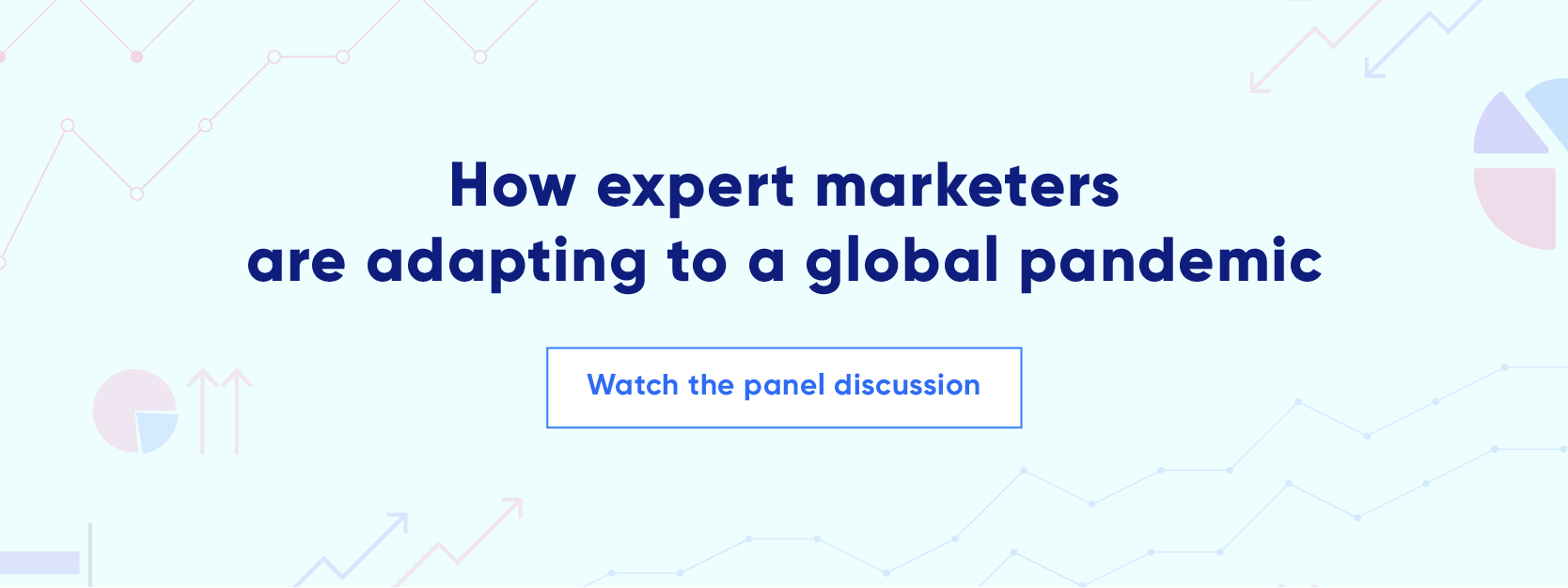Learn how you can Unlock Limitless Customer Lifetime Value with CleverTap’s All-in-One Customer Engagement Platform.

A matter of weeks ago, the world was a very different place.
The global economy was at historic highs and businesses were seeing new records in customer engagement. Mobile brands, in particular, were experiencing unprecedented peaks in app engagement and revenue, with consumers spending 52% of their digital media time engaging with apps. This year’s mobile ecommerce sales are expected to hit over $338B dollars in the US alone.*
Or at least, they were.
The global coronavirus pandemic has upended life as we know it — and the full impact on mobile brands is yet to be determined. Marketers are grappling with a great deal of uncertainty around what this pandemic will ultimately mean for their users, their industries, and their brands.
Last week, we hosted a webinar panel discussion and asked top mobile marketers: What impact has coronavirus had on your industry, and how is your brand addressing this pressing issue? Below are their insights and experiences. ![]()
For us in OTT, we’re seeing a lot of new downloads. Customer acquisition costs and cost per click on our social media campaigns is down drastically. Existing customers are also engaging more often.
It’s been a challenge catering to this huge new audience, especially since production has come to a standstill and we don’t know when it will resume. The way we had planned our content strategy has completely changed. We’ve had to shift focus to make the most of our entire content library.
We’ve updated our algorithm to feature older content that’s from 2-3 years ago. Users have already watched our latest content, and those older series are now seeing a lot of engagement.
— Swati Paliwal, Marketing Head, TVFPlay
Three trends are emerging: one is that cash flow is in a crunch. Demand for most products has gone up, but people have less cash to spare so order values have been affected. Second, utilitarian items are being purchased more, while people are holding off on buying optional items. And third, service and content consumption is now happening entirely at home. To survive, brands must learn how to shift to deliver value and support customer needs at home.
— Samar Singla, Founder & CEO, JungleWorks (Jugnoo)
In retail, brands have moved from focusing on profitability to evaluating how they can survive the next year: staff, inventory, etc. The ripple effect of canceled orders will hit the supply chain, so when stores begin to open back up we’ll see a surge of discounts (as we’re now seeing in China). Deliveries aren’t happening in stores, people are and will continue to shop online and have items delivered to their homes.
— Vishal Kapil, CTO, Marks and Spencer India![]()
The marketing and sales funnels have flipped. It’s now easier and cheaper to generate leads, but closing deals, delivering services, and receiving payments have become more difficult. What we’re anticipating, as a primarily sales-driven organization, is that the number of sales will either remain steady or even increase, but order values will fall. In response, we’re actually expanding and ramping up our sales team to keep up with the higher volume of leads and help lower cost per acquisition by making the sales process more efficient.
— Samar Singla, Founder & CEO, JungleWorks (Jugnoo)
As the largest retail brand in the country, home delivery was never a key pillar for us. But there was a lot of panic after the lockdown was announced, and we received a huge volume of calls — 10,000+ calls in Bangalore alone — from concerned customers worried about access to services. In response, we’ve made every effort to activate our operations teams to be able to provide home delivery services.
It’s important for us as a brand to empathize with our customers, be a positive part of our larger community, and make sure that everyone has access to groceries — especially fruits and vegetables. As an example, we’ve made it possible for communities to place shared orders where only one person needs to come to the store to pick it up and can then bring it back to distribute amongst their neighbors. We want to reach as many customers as possible and help take care of their needs.
— Reetesh Gade, Head of Marketing, Future Group (Big Bazaar)
Moving forward, more media and content companies will likely move to a subscription-based model. If marketing budgets continue to be reduced and companies tighten their ad spend, I don’t think advertising revenue will be enough to sustain these businesses. So I believe the industry will see a lot more subscriptions going forward — and you already see it in journals like The Guardian and The New York Times.
— Swati Paliwal, Marketing Head, TVFPlay![]()
Our B2B SaaS platform helps global companies like Coca-Cola manage deliveries. A lot of governments and NGOs are also using our solution and can’t afford the cost. In response, we’ve made our services temporarily free to organizations that are delivering essential products. Yes, our data is changing, but so far not in a way that’s usable. Our main focus right now is to keep our servers up and running, stay afloat, and win customers.
—Samar Singla, Founder & CEO, JungleWorks (Jugnoo)
At Marks and Spencer, we went live with our website just last week — right before the lockdown was announced. We had been seeing a huge amount of traffic and a lot of orders, and then we had to shut everything down because distribution centers are at a standstill. However, unlike many other retail brands, we have kept our catalog and site open. The amount of data we’ve gathered in the last week alone is tremendous, and we’re getting amazing insights into what products and categories people are looking at. We actually had a different perception about what products would sell, and the traffic is showing us a different picture. Because of that, we’re now able to adjust our inventory plan.
– Vishal Kapil, CTO, Marks and Spencer India![]()
When the lockdown happened we couldn’t immediately change every campaign that was planned. But we did go through everything to ensure we weren’t sending out any messages that came across as tone-deaf or insensitive.
Empathetic messages are definitely getting higher engagement, and we’re seeing campaigns with more humor and humanity are getting shared and trending.
After constantly being tuned into news channels and dire headlines, customers are looking for an escape. Users want to know the latest updates on COVID-19, but they also want to connect with other people and have some fun. TikTok is actually really ramping up influencer marketing right now, leveraging Instagram and Facebook to draw users to the platform.
—Swati Paliwal, Marketing Head, TVFPlay
With our gaming and quiz app, we’ve launched a social quest where users can donate the rewards they earn to healthcare workers and first responders: such as facemasks, hand sanitizer, etc. It’s creating more awareness around COVID-19 and empowering our users to help.
— Abhishek Sharma, Co-Founder & COO, GOQii Technologies![]()
Speaking for the retail industry, budget will only be used for promotions and offers in Q3 and Q4. Most companies are doing their financial planning right now, and nearly everyone is saying that Q1 and Q2 are a washout. Mall owners aren’t charging rent for the next few months, so mall owners are also in a fix. As far as capital expenditures, most companies are completely cutting down on spending unless it’s absolutely necessary. It’s not an easy situation.
— Vishal Kapil, CTO, Marks and Spencer India
Even in difficult times, there are opportunities. Losses will happen, but we’re telling our team: what products are going to be hot in the next 6 months? In the next 2 years? We’re taking this opportunity as a time to build for the future and stay optimistic.
— Samar Singla, Founder & CEO, JungleWorks (Jugnoo)
There is a growing demand for — and a great increase in knowledge about — digitalization. Because traditionally, healthcare, insurance, and pharma are very brick-and-mortar in their approach. But what we have seen in the past couple weeks is that they’re looking at serving their patients digitally. There’s a mind shift happening from sales to service. Instead of trying to push customers toward products, it’s about delivering service and value.
This is creating a new level of complexity, but it’s also opening up ideas for how digital tech can enable solutions in healthcare and insurance.
What I foresee in the next quarter or two is an equal opportunity to arise from the digital space, not from the reach and acquisition perspective being used right now in advertising, but from the core service delivery perspective also.
— Abhishek Sharma, Co-Founder & COO, GOQii Technologies![]()
In spite of new uncertainties, we’ve all seen this pandemic bring communities closer together to grow even stronger. We are grateful to our panelists for sharing their insights and experiences to help their fellow marketers build smart strategies to succeed in the months ahead.
View the full panel here and share how your marketing team has adjusted in the comments section. Or read more about how CleverTap is responding to the shifting challenges of COVID-19.